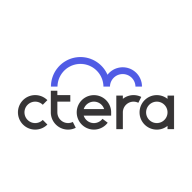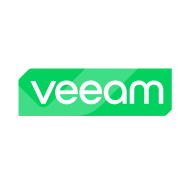

CTERA Enterprise File Services Platform and Veeam Data Platform both compete in the enterprise file services and backup solutions industry. Based on the provided information, CTERA appears to have the upper hand due to its strong scalability, flexibility, and hybrid storage capabilities.
Features: CTERA excels in scalability, flexibility, and hybrid storage capabilities, making it suitable for diverse deployment needs. Its proactive customer service and competitive pricing further enhance its appeal. Veeam, on the other hand, is noted for its potent backup and replication functionalities vital for virtualized environments, along with granular restore and seamless integration with numerous applications.
Room for Improvement: CTERA needs to improve monitoring tools, user experience, and efficient update processes. Veeam faces challenges related to feature integration, complex licensing, and could enhance backup speed and cloud integration.
Ease of Deployment and Customer Service: CTERA is recognized for outstanding customer service and ease of deployment, especially in hybrid environments. Veeam provides solid support but can encounter complexity issues in extensive deployments.
Pricing and ROI: CTERA offers competitive pricing leading to savings and lowered total cost of ownership by reducing manual storage management expenses. Although Veeam provides a flexible licensing model beneficial for large-scale deployments, rising costs have somewhat impacted its perceived affordability.
Adding SSD storage to Windows file servers is expensive, and we no longer need to back up those devices.
I am positive that CTERA has helped reduce the total cost of ownership by eliminating the need for manual storage management and reducing storage service processes.
They swiftly address concerns and take ownership of the call, providing a very satisfactory support experience.
High-priority issues are handled promptly.
I would rate their support a ten out of ten.
If we need to upgrade CPU and memory, we should be able to do that without a license upgrade.
CTERA is a very scalable product, allowing us to grow.
It offers good scalability options, including vertical and outward scalability.
It involves acquiring additional licenses as needed.
In order to scale Veeam Data Platform, we have to pay a lot more money.
It has been pretty stable since then.
We had things deployed for years, and we were suddenly getting cloud sync issues that were crashing our sites.
It is very stable and reliable.
There are no issues with stability in Veeam Data Platform.
AI and automation features could enhance the platform, such as AI-powered search, predictive storage analytics, and intelligent alerts for proactive monitoring.
It would help to have a global single-pane-of-glass view of all my CTERA devices.
One suggested improvement for the CTERA Enterprise File Services Platform is the ability to distribute data across multiple active backend storage nodes rather than the current limitation of a single active node.
The improvement we would like to see is the option to scale Veeam Data up in smaller sections rather than large sections, which requires paying much more.
Reducing it by 20% would make it more accessible to a broader range of customers.
Unlike other solutions that require hardware purchases, CTERA offers software licensing with flexibility across multiple infrastructure providers.
CTERA's pricing seems to be on par with some of the other players, such as Nasuni and Azure.
I find the pricing reasonable.
A reduction of 20% in the current cost would make the solution more attractive to clients.
From what I know, it is expensive to add modules, with a scale rating of eight out of ten.
As soon as something is written to the device, CTERA copies it to the cloud, where it's versioned with snapshots so we can recover it.
A vital advantage of this platform is its instantaneous recovery capability, allowing seamless access to a secondary gateway if the primary one fails.
It is a three-in-one solution for us. It is a file-sharing platform, an archiving solution, and also a backup solution.
The platform is user-friendly, comprehensive, and compatible with numerous market solutions, including virtualization and bare metal servers.
Veeam Data Platform is valuable for its stability and the ability to easily contact support for assistance.


The CTERA Enterprise File Services Platform provides a cloud-native global file system over public and private object storage, revolutionizing the world of hybrid cloud data solutions. Enhanced by a rich data services ecosystem, CTERA enables enterprises to gain full control of their data for optimal edge performance, data insight, and governance. The platform focuses on security, providing features like data encryption, access controls, and ransomware protection. Centralized management tools enable efficient data control and monitoring. The platform is being used to replace legacy NAS and file servers, especially at remote locations, and simplify backup and disaster recovery of file data while providing the flexibility of multi-cloud deployments with infinite scalability. CTERA is at the core of hybrid cloud transformations of some of the world’s largest banks, healthcare organizations, global media groups, and government agencies, in deployments that scale to tens of petabytes.
Veeam Data Platform ensures comprehensive data resilience by offering secure backups and intelligent data insights, catering to the complexities of modern data management.
Veeam Data Platform empowers businesses with reliable data protection, orchestrated recovery, and streamlined management. Providing peace of mind, it guarantees data is secure, available, and effortlessly recoverable. Organizations benefit from features such as instant recovery, simplified management, and compatibility with virtual environments. While it shines in backup and restore capabilities, it calls for improvements in integration with physical servers and enhanced cyber security features.
What are the key features of Veeam Data Platform?Organizations in industries like finance, healthcare, and manufacturing utilize Veeam Data Platform for critical data management, ensuring business continuity and disaster recovery. Employed in securing both virtual and physical workloads, Veeam integrates cloud storage for enhanced scalability and efficiency.
We monitor all Cloud Backup reviews to prevent fraudulent reviews and keep review quality high. We do not post reviews by company employees or direct competitors. We validate each review for authenticity via cross-reference with LinkedIn, and personal follow-up with the reviewer when necessary.